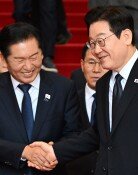[Editorial] Time for Unions to Ante Up
[Editorial] Time for Unions to Ante Up
Posted December. 01, 2006 06:37,
Bills for non-regular workers were finally approved yesterday in an Assembly plenary session despite opposition from the progressive Democratic Labor Party (DLP). The bills submitted to the National Assembly after a dialogue between the government, labor and management dragged on for over two years due to the opposition of the DLP.
Although the Korean Confederation of Trade Unions and the DLP demanded a limit on hiring non-regular workers to temporally replace employees on leave due to childbirth or illness, their demands were unprecedented and not persuasive. In addition, DLP lawmakers did not even try to participate in the discussion, practically permitting the bills to pass by tacit consent. They probably could not disregard the fact that the more the bills are delayed, the more 5.48 million temporary workers would have to suffer from discrimination.
If the non-regular worker bills take effect from July next year, companies will be banned from discriminating against non-regular workers whose duties and productivity are comparable to regular workers in terms of wages. For instance, regular bank clerks get paid about twice as much as non-regular workers get paid, including welfare benefits, even if they have the same duties. Although it is good to hear that major workplace discrimination may disappear, businesses will have to suffer from a burden of increased labor costs. It may also lead to conflicts between labor and management and weaken corporate competitiveness.
Once the bills take effect, employers will have to either turn non-regular workers they have hired for more than two years into regular workers or fire them. Although the government says it will prevent the layoff of non-regular workers working for public corporations, private companies are likely to reduce the number of non-regular workers to reduce labor costs. A mass layoff of irregular workers can be only prevented when regular workers, who have been paid more than irregular workers for doing the same amount of work, share their privileges with their co-workers.
Losing skilled non-regular workers is a loss for companies as well. In order for employers and non-regular workers to have win-win outcomes, the non-regular workers who will become regular workers should not demand too much at once.
All labor organizations, including the Korean Confederation of Trade Unions, have always demanded the elimination of discrimination against non-regular workers every time they held a general strike. However, they are the very reason for the large number of non-regular workers. Labor unions which have not given up their privileges have been trying to interfere with management rights. It is now time for labor unions, which have constantly demanded corporations to sacrifice all the time, to make sacrifices themselves for their hardworking colleagues.







